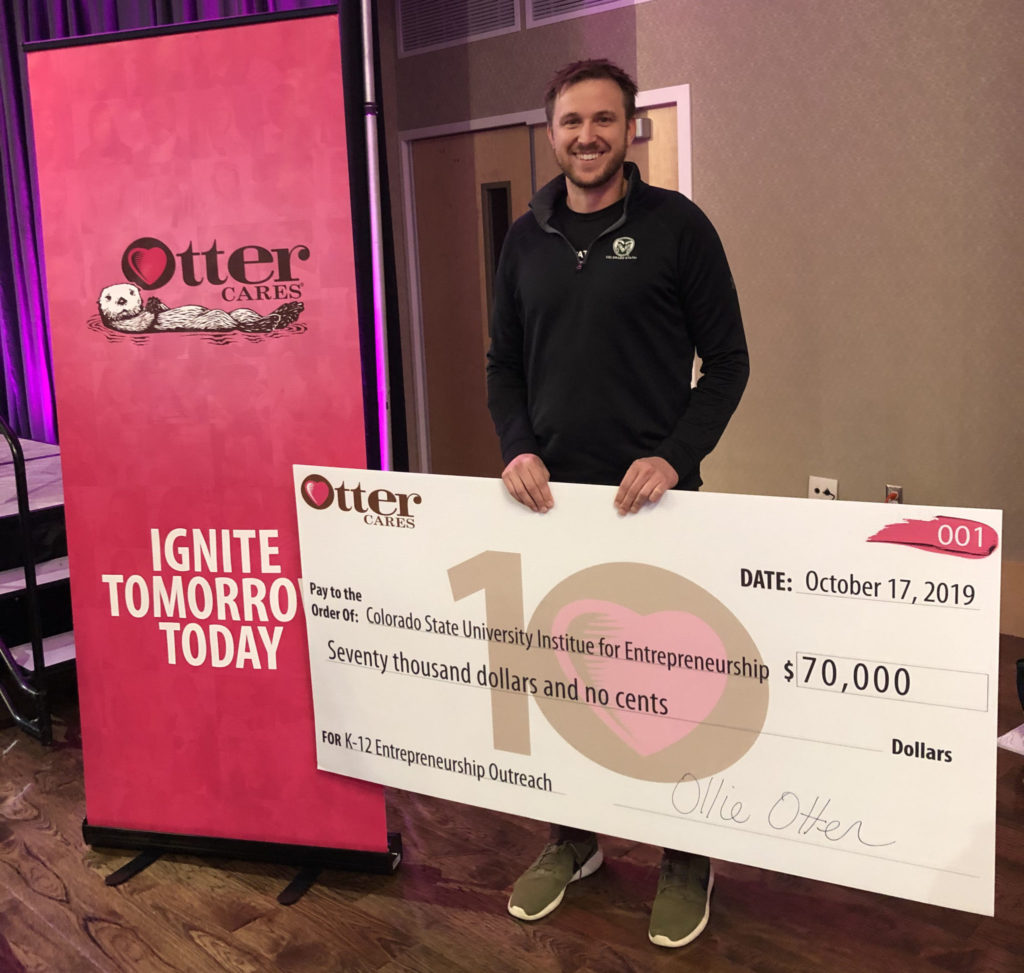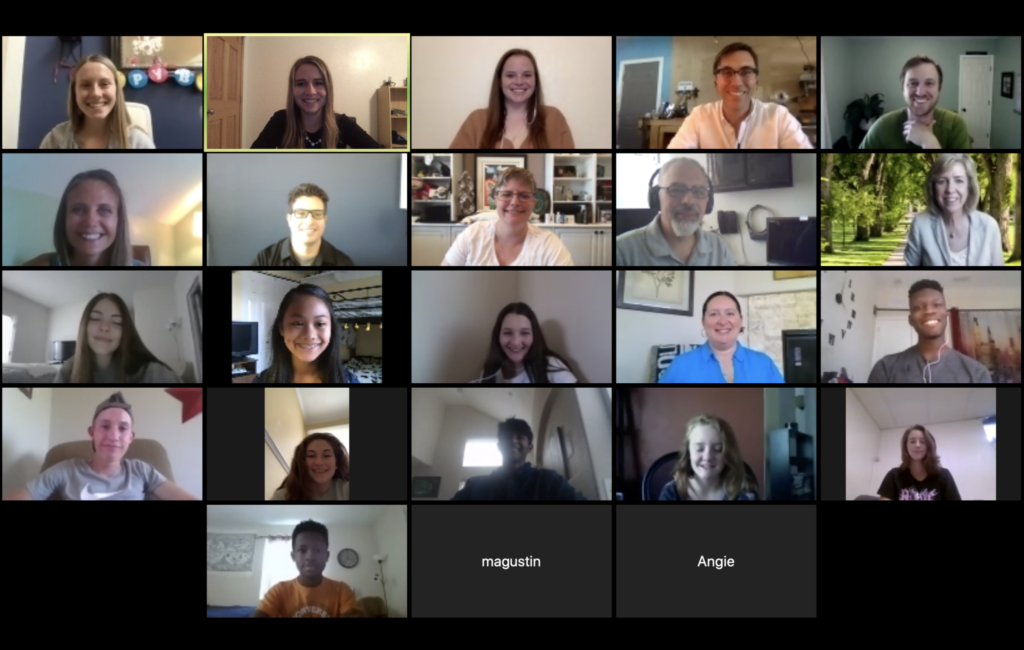 Although most people don’t picture children when they think about entrepreneurship, you only have to look at summer’s ubiquitous corner lemonade stands and neighborhood lawn-mowing services to see that kids have always been entrepreneurial.
Although most people don’t picture children when they think about entrepreneurship, you only have to look at summer’s ubiquitous corner lemonade stands and neighborhood lawn-mowing services to see that kids have always been entrepreneurial.
To encourage and develop that entrepreneurial spirit, the College of Business’s Institute for Entrepreneurship is creating new programs for middle- and high-school students. Through innovative, immersive classes and workshops, the Institute is helping these students and their teachers realize their dreams – and their potential.
Growing Entrepreneurship in Youth
The Institute’s new K-12 entrepreneurship programming, funded by a $70,000 grant from Otter Cares, partners with local school districts to advance entrepreneurship education in Northern Colorado. Since launching in early 2020, the Institute has held three K-12 programs focused on different areas of entrepreneurship education: classroom engagement, teacher professional development and a high school summer camp.

“The idea [behind this new K-12 programming] is, how do we create pathway for students into entrepreneurship with the Institute’s zero-barriers approach and into College of Business?” said Hope Parker, the Institute’s new program manager of K-12 partnerships. “We want to start to show students how they can be entrepreneurs and how they fit into business world.”
To begin this partnership, Parker conducted a needs assessment in local schools to discover what business and entrepreneurial concepts are currently being taught and how that differs from what schools actually need and want to teach. Based on what she learned, the Institute’s team created pilot programs that focused on teaching both students and educators the fundamentals of entrepreneurship.
Teaching the Teachers
Many local high schools offer business education, but Parker realized through her needs assessment that many educators teaching business classes have little experience with entrepreneurship. With Institute for Entrepreneurship Director Scott Shrake, Parker developed a week-long Venture Validator curriculum to teach these educators practical entrepreneurship skills. Participating teachers were asked to bring a business idea or a problem they’d like to solve to the four-day workshop, where they learned the terminology and process of entrepreneurship and developed their ideas.
“Teachers can get caught up in theory and not necessarily practice, and we wanted to get them out of that and into Venture Validator with community members and students that really had business ideas they wanted to work on,” said Parker, a former sixth-grade teacher who has worked in entrepreneurship education for several years.
On the last day of the workshop, Parker brought all the teachers together to share their ideas and offer suggestions on how each participant could implement their business idea in their classroom.
“I said, ‘O.K., now that you’ve seen what entrepreneurship looks like, how would you implement this in your class? What are the resources we have available in K-12 programming but also at the University, College of Business and Institute level that can help you?’”
Solving ‘Big World Problems’ with Entrepreneurship
The other pilot program brought together six high school students and two College of Business undergraduate mentors once a month for the Spring 2020 Semester to work on new ventures. The mentors helped the students think through questions about scope, potential customer base and other key elements of a business plan. At the end of the semester, the Institute team joined in on student mentoring sessions to help the students work through any remaining questions and give them resources for the next phases of their ventures.
Based on the success of the pilot program, Shrake and Parker launched a Virtual Venture Validator program for middle and high school students in early summer. The diverse group of 12 students hailed from around the country and brought unique venture ideas that primarily focused on socially responsible entrepreneurship.

During the week-long workshop, students worked with professional mentors to hone their business ideas. The program culminated in a pitch competition, where students presented their ideas to a panel of judges.
“The kids had the coolest ideas about how to solve big world problems with viable solutions,” she said. “They really are learning to be critical thinkers, and it’s so great to see them go through that process.”
Parker originally planned to offer the program in person but moved it online when the College shifted to virtual education due to COVID-19. And although shifting to online education was a challenge, Parker said the end result was a positive one because it let students from rural areas and mentors from around the country engage and connect.
“We had a real ability to reach out to our network,” she said. “Before it was about bringing people to campus or putting them in classrooms, and now we don’t have to worry about that.”
Parker is hopeful that the program can take place on campus next summer, but she said the Institute will hold some sessions virtually and in satellite locations so that students in rural areas can participate.
Investing in Entrepreneurship Education
These initial programs demonstrated the need – and demand – for entrepreneurship education in Northern Colorado school districts. To develop additional programming, Shrake and Parker are looking to raise money from a variety of sources, from corporate philanthropic dollars (such as the Otter Cares grant that’s funding their current efforts) to grants to long-term fundraising campaigns.
“We’re hoping to continue to grow,” she said. “We want to raise money for scholarships, we want to do college classes online for high school students. We have a lot of things in the works.”
One of those things is a new fall education program with two tracks: one for teachers and students who have participated in Venture Validator and one that’s open to all local students and educators.
In the first track, teachers will partner with the Institute to bring entrepreneurship education into their classrooms. The Institute will provide access to College of Business student mentors and experienced industry mentors, as well as curriculum and programming that will help teach students about entrepreneurship and work with them to develop business ideas. The program will culminate in a showcase where students will present their ideas to a group of judges and compete for prizes.
The other track will offer resources and tools for entrepreneurial novices. For these participants, the Institute will design a series of virtual events where students will learn about the College of Business, hear from a variety of entrepreneurs and ask questions to learn more about entrepreneurship and business. The Institute will also offer Venture Validator, I4E Ramcast and other programming and resources for students and teachers.
“The hope is that we’ll start to inspire the next set of entrepreneurs,” Parker said. “We’d love for them to actually have ventures that come out of this, but if they come out with an entrepreneurial mindset – curiosity and making connections, and problem-solving skills – that’s what we’re hoping to instill.”
Get Involved
Parker is looking for alumni and partners to mentor students, participate in panels, speak to classes and more. To find out how you can get involved, email bizventurerams@colostate.edu.